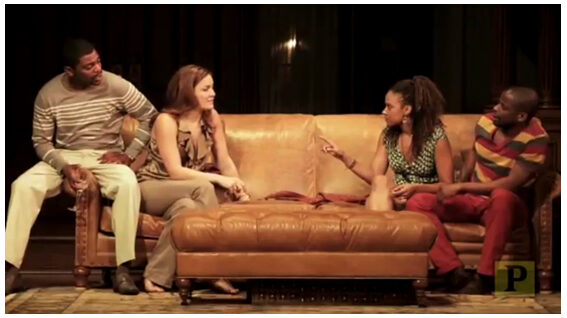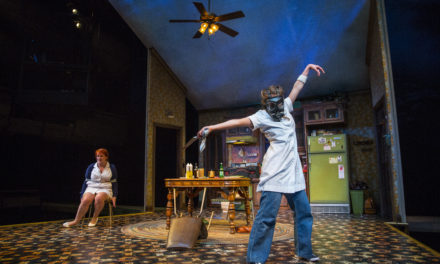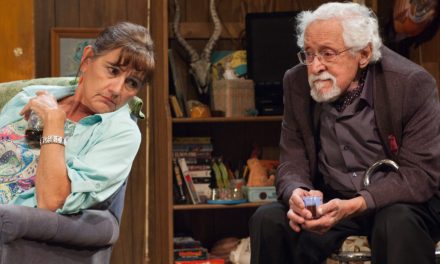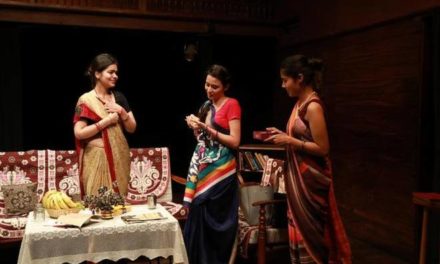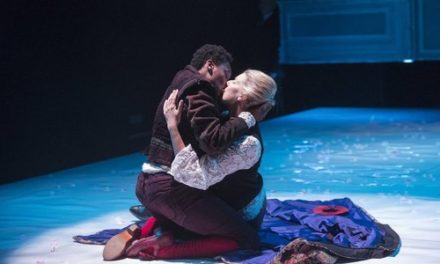Ntozake Shange, author of the famous Broadway play For Colored Girls Who Have Considered Suicide / When the Rainbow is Enuff, once said: “My goal is to be a primary, not a secondary source.” It’s a goal that more African-American thespians, filmmakers, and documentary makers all over the world should adopt in order to, as we say in East Africa, ‘tell the story properly.’ Outsiders looking in may have the best of intentions but not be able to capture the soul of Black folk.
VISIONS OF AFRICANS
In the introduction to her book If I Can Cook / You Know God Can, Ntozake Shange wrote:
“I am drawn to visions of Africans, like me, during the Middle Passage. I want to know what we yearned for, dreamt of, talked about if we could manage. But then there’s the problem of who we could talk with, since we came from so many varied regions on the continent, a plethora of tongues forced into some pidgin dialect…”
Ntozake’s For Colored Girls Who Have Considered Suicide (1977) was the second play by a Black woman to reach Broadway. It contains deeply personal, poetic narratives by several African-American women characters. It was nominated for a Tony Award in 1977 and a Grammy Award in 1978. In 2010, it was adapted for film by Tyler Perry of Madea fame. The film version starred pop icon, Janet Jackson. Ntozake also wrote other successful plays, including an adaptation of Bertolt Brecht’s Mother Courage and Her Children (1980) which won an Obie award. A poet, playwright, and feminist, Ntozake died on October 27th, 2018 in Maryland, USA, aged 70.
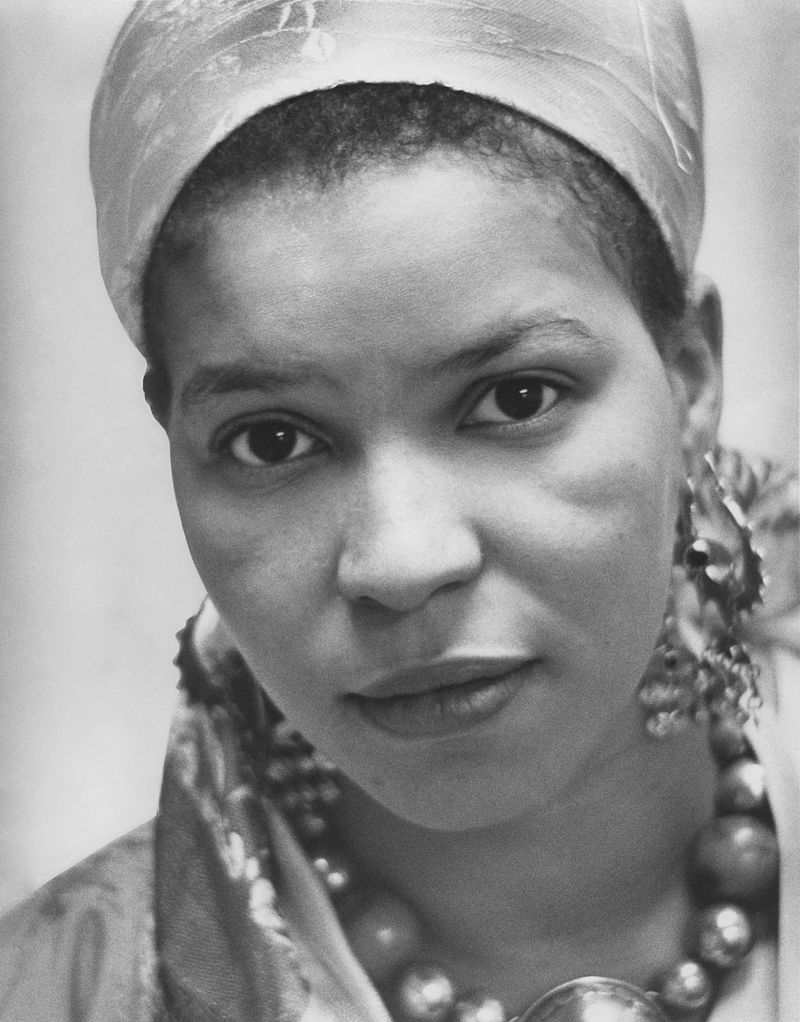
Ntozake Shange in 1978. (Photo: Chris Woodrich)
PAN-AFRICANISM
In a brilliant and concise paper titled, ‘Student-Centered Designs of Pan-African Literature Courses’, Babacar M’baye of Kent State University shows the importance of yet another famous African-American play – A Raisin in the Sun by Lorraine Hansberry – on the audience’s psyche:
“In a similar vein, A Raisin in the Sun introduces students to Pan-Africanism because it explores the relationships between African Americans and Africans. First, the play identifies a significant strain of African American pessimism about Africa. Second, it qualifies this pessimism by depicting positive cultural and intellectual relationships between African Americans and Africa. Third, it discusses the role of independence in the destiny of Africa. The play presents an image of Africa that was current among many African Americans and African political leaders during the 1950s, at a time when many African countries were being granted their independence by Europe. At the middle of this image lies the ignorance of many African Americans of that decade about Africa, as Hansberry shows in the dialogue in which Mama, Beneatha’s mother, confounds Nigeria with Liberia (56), gives money at church to help save Africans from heathenism (57), and naively admits that “I think it’s so sad the way our American Negroes don’t know nothing about Africa ‘cept Tarzan” (64).
AWARDS AND NOMINATIONS
‘Mike Tyson had a one man show / Let’s give the man a hand,’ host Neil Patrick Harris sung during the opening performance of the 2013 Tony Awards. The one-man show referenced was Undisputed Truth, a soul-searching autobiographically narrative by former heavyweight boxing champion Mike Tyson. It was directed for the stage by famed Black film director Spike Lee (Malcolm X, Do The Right Thing, He Got Game). (As a side-bar, Tyson’s show had some hilarious anecdotes. One involved his feud with fellow Black boxer Mitch Green, and another his ex-wife’s dalliance with Hollywood A-lister Brad Pritt.)
Bearing in mind that Black Americans are the minority in the US, it is safe to say that there has been a healthy number of Black-oriented and Black–led shows on Broadway. In addition, there has been a commendable number of Black Tony Award nominees and winners, over the decades. Well-known Broadway shows with all-black or mostly-black casts have included:
- Ain’t Misbehavin’ (musical)
- Bring in ’Da Noise, Bring in ’Da Funk (musical)
- Cabin in the Sky (musical)
- The Colour Purple
- Dreamgirls (musical)
- Eclipsed
- Fences
- It Ain’t Nothin’ But the Blues (musical)
- Porgy and Bess
- Sarafina! (musical)
- A Raisin in the Sun
- Timbuktu! (musical)
- Voodoo Macbeth
- The Wiz
- Jelly’s Last Jam (musical)
- Ma Rainey’s Black Bottom
- For Colored Girls Who Have Considered Suicide / When the Rainbow is Enuff (‘choreopoem’)
More recent shows include:
- Radio Golf (which grossed USD $1.8 million in an 11-week run)
- Gem of the Ocean (A play by August Wilson)
- Fela! (A musical based on the life of Nigerian singer Fela Kuti)
- Undisputed Truth (A one-man show performed by former boxer Mike Tyson)
- The Mountaintop (A fictionalized account of Martin Luther King Jr’s last evening alive)
- Stick Fly (Produced by R&B singer Alicia Keys)
BUSINESS
According to a Black Enterprise magazine article titled ‘The Business of Broadway’, written by Carolyn M. Brown, about 76% of all Broadway theatre-goers are White, the rest being ‘people of color.’ Black patronage peaked at 6.7% in 2007, during a season that included The Colour Purple. In 2009, Black theatre-goers accounted for a paltry 2.6% of that year’s 12.2 million ticket buyers. (Black Enterprise, Dec 2011, Vol. 42, Issue 5, Page 92)
Seeing how little the Black community contributes to the bottom line, it would be unfair to describe Broadway – which consists of 40 New York theatres of varying sizes – of racism. In fact, Broadway is arguably a model of inclusion. Apart from Blacks and other minority (sub)races in America, Broadway has also shown admirable tolerance for other marginalized groups, such as the LGBTQ community.
QUOTABLE QUOTES
August Wilson, American playwright and poet regarded by some critics as ‘the American William Shakespeare’, is the only African-American with a Broadway theatre named after him. He was quoted as saying:
“I wasn’t trying to start a revolution or anything. It was just the way I did it, and I didn’t go around insisting this is the way it should be done. I just go, “This is me and that’s you, and I like your play and the way you did it, that’s cool, but this is the way I do it.” So many people said I couldn’t do it that way, but I just persisted. As I say, it turned out good. It didn’t have to turn out that way, but people saw a value in it.”
Similarly, prolific (and I do mean prolific!) screenwriter, playwright, actor, and filmmaker Tyler Perry once said:
“I don’t really think in terms of racial experiences anymore. Even though I’m a Black man writing plays and movies with Black people in them, the themes are universal.”
In my view, that last line is the key to Broadway’s inclusiveness: ‘the themes are universal’. Hosting Broadway performances at the White House, when he was the US President, Barack Obama once said:
“Over the years, musicals have also been at the front of our social consciousness, challenging stereotypes, shaping our opinions about race and religion, death and disease, power and politics. But perhaps the most important part of this truly American art form is its optimism. Broadway music calls us to see the best in ourselves and in the world around us. To believe that no matter how hopeless things may seem, the nice guy can still get the girl, the hero can still triumph over evil and a brighter day can be waiting just around the bend.”
In days gone by, Broadway was a Native American trail that ran the length of Manhattan. Today, its nickname is ‘The Great White Way’ due to the myriad neon signs that light up the street. Racially, however, it’s more like ‘The Great, Beautiful, Majestic and Multi-Colored Way.’
This essay is an excerpt from the research document Changing the Literary Map of Africa (2019), written by writer/playwright/critic Alexander Nderitu. Reposted with permission.
This post was written by the author in their personal capacity.The opinions expressed in this article are the author’s own and do not reflect the view of The Theatre Times, their staff or collaborators.
This post was written by Alexander Nderitu.
The views expressed here belong to the author and do not necessarily reflect our views and opinions.

